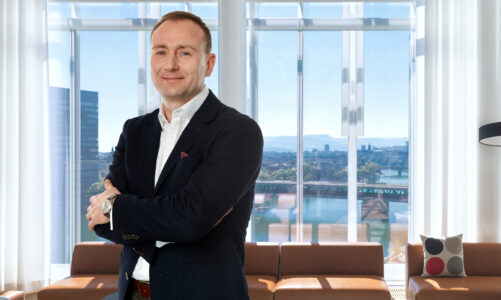Hydrogen, mainly renewable hydrogen, i.e. produced from renewable electricity, is the future of technological development and ecological transformation. Maciej Romanów, a member of the Board of Directors of ORLEN Unipetrol Group responsible, among other things, for the decarbonisation and development of hydrogen technologies, outlined the main strategic areas of hydrogen use and also pointed out the dangers of the insufficient legislative support in the Czech Republic.
You are a major producer and distributor of hydrogen. In what areas do you see its application?
As technological development is moving forward, hydrogen is becoming an increasingly important gas in the transformation towards a low-emission and emission-free future. If we are to meet our commitment to become emission neutral by 2050 at the latest, it is essential to develop the use of hydrogen in the decarbonisation of production technologies and, in particular, mobility not only on the road but also on the railways and, in the more distant future, possibly also at sea or in the air. For the general public, its most significant use is in road and rail transport, where hydrogen electric vehicles can suitably complement battery electric vehicles. We are currently the largest producer of hydrogen in the Czech Republic. During the oil refining process, we produce almost 90,000 tonnes of hydrogen per year. In the near future, we also want to produce so-called renewable hydrogen, which will be produced by electrolysis using electricity from renewable sources, i.e. from the solar, wind or geothermal energy. Our first planned project expects production up to 4,500 tonnes per year. This could cover the operation of around 30,000 hydrogen electric vehicles per year.
You have become a signatory to the Hydrogen Mobility Initiative. What is its goal?
In developed parts of the world, hydrogen is seen as a complementary part of a package of measures towards true sustainability, and accordingly hydrogen is built into national clean mobility development plans and the right conditions have been created for its widest and fastest possible implementation. Together with other multinational companies with experience from all over the world, we feel that in the Czech Republic the perception of hydrogen could be more intense and support for its promotion could be higher. Together with our partners from Toyota, Alstom and Air Products, i.e. companies with extensive experience with hydrogen, we appeal to the Government of the Czech Republic and society as a whole that without effective support for hydrogen solutions, both in terms of legislation and implementation, the Czech Republic will cease to be competitive.
The first hydrogen bus started running in Prague. Czech Railways is considering hydrogen-powered units. What opportunities do you see with the application of this propulsion in regional transport?
It´s very essential. We want to participate in the development of hydrogen electromobility because we have good know-how within the parent company and we are building that here in the Czech Republic. We are signatories to hydrogen memorandums with many regions in the Czech Republic and with private companies that are in the hydrogen business. We operate two full-fledged and self-service hydrogen stations and are preparing the construction of others so that we can build a hydrogen infrastructure in the Czech Republic to enable comfortable domestic and international travel and the mass transport of people and goods. We are involved in testing a hydrogen bus not only in Prague, but also in the Ústí nad Labem region in the cities of Most and Litvínov. As the largest producer of hydrogen, we also want to be a partner for rail transport. There are still many places in the Czech Republic where the railway line is not electrified. These can be efficiently served by a hydrogen electric train that is compatible with all types of lines.
Thank you for the interview.




